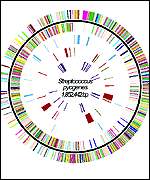
'Flesh-eating' bug genome decoded
URL: http://news.bbc.co.uk/hi/english/sci/tech/newsid_1269000/1269157.stm
Date accessed: 24 May 2001
BBC News
Tuesday, 10 April, 2001, 10:14 GMT 11:14 UK
The strep A bacterium is responsible for more human diseases than any other, including sore throat, scarlet fever and rheumatic fever.
In rare cases, the bug is able to invade the whole body, triggering so-called flesh-eating disease, necrotising fasciitis, which rots the flesh away.
The genetic sequence should pave the way for better treatment and
prevention
|
|
Anthony Fauci, National Institute of Allergy and Infectious Diseases
|
Researchers at the University of Oklahoma Health Sciences Center, US, revealed on Monday that they had completed a five-year project to sequence the genome of Streptococcus pyogenes, or group A streptococci.
Most instances of necrotising fasciitis, such as the apparent cluster in Gloucestershire that caused a health scare in 1994, are caused by the bug.
Joseph Ferretti, the molecular biologist who led the project, said it was only the second bacteria of its kind to be sequenced.
"What makes this different is that the group A streptococci cause such a wide variety of diseases - more so than any other micro-organism," Mr Ferretti told BBC News Online.

Genome map
|
The strain of bacteria examined was isolated from the infected wound of a patient. It contained about 1,752 genes, 40 of which seem to be linked to the bug's ability to cause human disease.
"We need to know more about how group A strep interact with humans to cause so many different illnesses," said Anthony Fauci, director of the National Institute of Allergy and Infectious Diseases, US, which funded the project.
"The genetic sequence should shed light on these questions and pave the way for better treatment and prevention."
The research is published in the Proceedings of the National Academy of Sciences.
Category: 32. Genome Project and Genomics